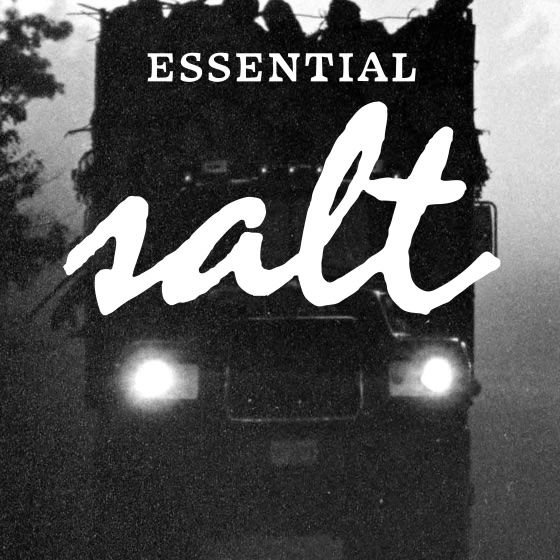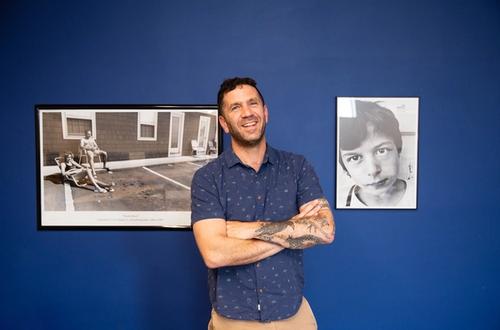Salt Institute for Documentary Studies

Story can change you.
The Salt Graduate Certificate in Documentary Studies is a unique semester-long program, focused on training the next generation of storytellers with professional students from all over the U.S. and around the world. This program offers three study tracks: Radio & Podcasting, Short Film, and Writing.
Salt Alumni Career Paths
Our alumni go on to work at the world’s leading news and storytelling organizations, including:
Al Jazeera
Associated Press
Audible
British Broadcasting Company
National Geographic
National Public Radio
New York Magazine
Newsweek
Radiolab
Spotify
The HISTORY Channel
The New York Times
The New Yorker
The Washington Post
This American Life
TIME Magazine
U.S. News & World Report
Wondery
Track Overview
Short Film
Students use a combination of documentary film, journalism, ethics, anthropology, art, and design fundamentals to tell compelling visual and audio stories. Over the course of the semester, students shoot and produce two projects: a short film and an in-depth piece. Graduates leave with a portfolio of work ready for submission to international festivals and a new level of understanding around the importance of ethical storytelling.
Radio & Podcasting

Over the semester, students learn how to create sound-rich and complex audio narratives under the guidance of industry veterans, producing a variety of audio assignments as well as an in-depth final project. Students gain critical experience pitching work and marketing themselves as radio producers. Graduates leave with a portfolio of work, ready to start or build upon their audio careers.
Listen to Season 2 of Essential Salt
Writing

Salt’s Writing program is a return to the long-form narrative nonfiction that has defined Salt for decades. Students in the Writing track will learn how to identify, research, and report a compelling story; understand narrative structures; master the art of critique and revision; pitch story ideas; deal with documentary ethical issues responsibly and sensitively; and market themselves as writers. Students will also be introduced to editors and other industry leaders and will work on placing their stories as part of the class.
Program Outcomes
The successful Salt student....
- Demonstrates the ability to create documentary work in their respective media of study.
- Applies the use of research, analysis, interpretation, creativity, craft and aesthetics to the development of documentary storytelling.
- Focuses on civic engagement with an understanding of the critical role artists have in impacting communities.
- Demonstrates professional practices within the field of documentary studies and is aware of relevant current issues.
- Demonstrates an ability to define a vision and then to determine a realistic and effective strategy that will allow the realization of the vision.
- Thinks independently, integrates and synthesizes information.
Learn more

Jo Strogatz, Salt '24, Winner of the 2025 NPR College Podcast Challenge Grand-Prize.
During this rigorous learning experience, students take the time to create and critically examine their own work and the work of classmates in a collaborative environment. They leave with a professional quality body of beautifully crafted, in-depth stories.
Courses mirror the structure and flow of an editorial team, with students working as both producers and editors. Students regularly listen to professional and student-produced stories to develop a deeper understanding to effectively discuss audio and visual storytelling.
Maine College of Art & Design also offers shorter Salt Intensives through our Continuing & Professional Studies program.
Admissions Support
Ready to Apply?
The Salt Graduate Certificate runs twice a year. Salt Spring starts mid-January and ends early-May. Salt Fall starts late-August and ends mid-December.
Fall 2026 Deadlines
Early Application Deadline: Sunday, March 8, 2026
Application Deadline: Sunday, May 3, 2026
Projected Program Start Date: Monday, August 31, 2026
After the Application Deadline, applications are reviewed on a rolling basis as space permits.
For additional help, please contact our Graduate Admissions Coordinator, Joel Tsui, at joel.tsui-staff@meca.edu.
Scholarships & Financial Aid
Completion of the Salt Graduate Certificate in Documentary Studies requires 16 credits. The cost per credit is $782.
Too often, documentaries reinforce the inequality present in our societies rather than challenging it. The Salt Institute for Documentary Studies is committed to training storytellers in ways that are equitable and inclusive. Part of our mission is to transform the field so it reflects and amplifies a diversity of experiences, identities, and voices.
Salt is also proud to offer the Spotify Studios Union Scholarship, generously underwritten by Spotify Studios.
To learn more about the financial commitment and funding opportunities, visit Tuition & Financial Aid.
Salt Faculty
All Salt staff and instructors are veteran documentarians, journalists, and storytellers. Their work has appeared in the most notable national and international outlets, and they have won some of the highest awards in media.
Micaela Blei, Visiting Professor of Storytelling, The Salt Institute for Documentary Studies
Isaac Kestenbaum, Salt '08, Director, The Salt Institute for Documentary Studies
Peter Lang-Stanton, Salt '14, Adjunct Instructor of Radio & Podcasting, The Salt Institute for Documentary Studies
Erin Murphy, Adjunct Instructor of Short Film, The Salt Institute for Documentary Studies
Salt Graduate Certificate in Documentary Studies FAQ
What makes the Salt Graduate Certificate program different from other documentary programs?
Salt is a full-immersion experience that mirrors the pace and structure of real-world editorial environments. With small cohorts, direct mentorship from working professionals, and an emphasis on ethical storytelling, students are challenged to develop stories that are not only technically strong but deeply responsible and impactful.
What kinds of students typically enroll in the Salt program?
Salt attracts emerging and mid-career storytellers from a wide range of backgrounds, including journalism, filmmaking, audio production, creative writing, and the arts. Some students come with years of professional experience, while others are just beginning to develop a documentary voice. What they share is a commitment to crafting impactful, ethical stories in a collaborative learning environment.
Can I apply if I don’t have a background in documentary work?
Yes. While many students arrive with experience in storytelling or media, the program is designed to support a range of skill levels. Faculty and peers help each student develop their craft, whether refining technical skills or exploring a new documentary medium for the first time.
What will my portfolio include by the end of the semester?
Each track culminates in a professional-quality body of work: a short film and in-depth visual piece for filmmakers, multiple audio assignments for audio students, and polished long-form nonfiction pieces for writers. These projects are created with publication or distribution in mind, and many graduates submit them to festivals, platforms, or editors.
What kinds of career paths do Salt graduates pursue?
Salt alumni go on to become reporters, podcast producers, documentary filmmakers, editors, and narrative nonfiction writers. Many work for major media organizations, while others pursue freelance projects or independent productions. The professional portfolio built during the program plays a key role in launching or advancing these careers.
Why is it called Salt?
Salt was named by their original students in 1973.
Salt is a natural symbol for the magazine:
- Salt of the sea,
- salt-washed soil,
- salt marshes,
- salty people — the kind that won’t use two words when you can get by with one.
Salt Story Archive

Since 1973, the students of the Salt Institute for Documentary Studies have captured the spirit of the culture, people, and landscapes of the world around us. The collective body of work—stories and publications—is available online at saltstoryarchive.com.
Please contact Rachel Katz, Administrative Director of Graduate Programs (rkatz@meca.edu), with any Salt Story Archive inquiries.
Apply Today
Take the next step toward refining your documentary craft in a professional, immersive setting.
The Salt Graduate Certificate in Documentary Studies is your opportunity to focus deeply on storytelling, build a polished portfolio, and connect with mentors and peers who share your commitment to ethical, impactful work.
Whether you're ready to launch a new career or sharpen your existing skills, applying to Salt means investing in yourself as a storyteller—and preparing to share stories that matter.
“Going to Salt was one of the best things I ever did for my career. I learned how to be a thoughtful, but bold interviewer and put sources at ease. I learned how to give helpful feedback and collaborate with other storytellers. And I learned how to find interesting stories in a new city.”


